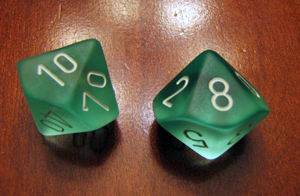I forgot to also buy a percentile die. I was thinking of rolling d10 for the first digit of the number for the right, for example 6, and then rolling the d10 again for the second digit, for example 9, in this case giving me a 96%. Is this legitimate?
3 Answers
Yes. In fact, this is what is usually meant when people say "percentile dice".
While actual d100s exist (large, almost completely round spheres), most people actually roll 2d10 (or 1d10 twice) and interpret it in the manner you say. d100s are considered somewhat unwieldy, while the d10 method is much simpler to use. It is even common for versions of d10s to be sold with a tens place inscribed on them in order to make it easier to unambiguously differentiate between the tens-place die and the ones-place die when rolling both together.
Yes. In fact this is the standard way to roll d100, as most dice sets don't include a 100-sided die.
To not be cheating, you need to have a consistent method of rolling.
- You could have two different colors; one always designated as the tens' place and one as the ones' place.
- or you could always roll the tens' place first and then the ones. This way, you're not rolling the two values and then deciding which digit they are. (otherwise a 19 is suddenly a 91 if that's better for you!)
Or some other method, just so it is consistent and clear before the dice hit the table.
-
1\$\begingroup\$ Looks great! Good last sentence. \$\endgroup\$– nitsua60Commented Feb 9, 2017 at 19:44
Yes, there is not diference between having a 1-10 die and a 10-90 die. note that:
- A 10(tens) and a 10 is 100%
- A 10(tens) and any other number is 1%-9%
-
1\$\begingroup\$ Well, it depends on the particular rules of the particular game system. Some systems have 100 values from 0 to 99. Some have 100 values from 1 to 100. \$\endgroup\$– BeanlucCommented Feb 9, 2017 at 18:04
-
\$\begingroup\$ @Beanluc I suppose, but since it was system generic, I gave the generic use of the 2d10 \$\endgroup\$ Commented Feb 11, 2017 at 6:45

